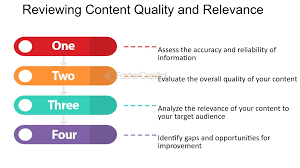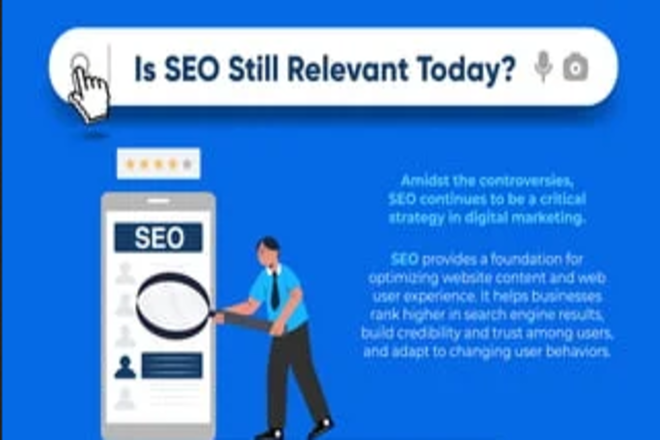There has been a lot of speculation going on about the fate and relevancy of Search Engine Optimization (SEO) in the ever-changing dynamic digital marketing landscape. Some people claim these days that SEO is dead or on the brink of extinction which is primarily due to advancements of artificial intelligence (AI) and search engine algorithms. There is a continuous discussion “Is SEO relevant?”
However, it is important for us to deny these misconceptions and understand that SEO continues to evolve and remains a crucial aspect of online success. Here, we will explore why is SEO relevant still today and how it will continue to thrive in the future. Is SEO Relevant?

Despite rumors of its demise, SEO is not dead and continues to evolve with technological advancements and user expectations. The growth of search engine platforms, the reliance on Google for search, the integration of SEO and UX, the competitive advantage that SEO provides, and the complexity of human search behavior all mean that SEO remains important and successful in the digital marketing environment.
That’s why it’s a great strategy. As long as people rely on search engines to find information, products, and services, SEO will continue to play a critical role in driving organic traffic, increasing online visibility, and achieving business success.
Some justifications why is still SEO Relevant
Growing Search engine platforms
With the increasing number of internet users and the rise of new search engine platforms, the importance of SEO has only grown. Google still dominates the search market, but platforms like Bing, Yahoo, and DuckDuckGo are gaining traction. This expansion provides ample opportunities for businesses to optimize their online presence and attract organic traffic.

Dominance of search on Google
Despite the emergence of various search platforms, Google remains the go-to search engine for billions of users worldwide. People rely on search engines to find information, products, and services, making SEO an essential strategy for businesses to get discovered by their target audience.
Intertwined SEO and UX
User experience (UX) has become a crucial factor in search engine rankings. Search engines prioritize websites that offer a seamless and user-friendly experience. Therefore, SEO techniques now encompass optimizing for website speed, mobile responsiveness, intuitive navigation, and engaging content. SEO and UX go hand in hand to provide a positive digital experience for users.

Brands to have a competitive edge through SEO
In today’s highly competitive online landscape, businesses need to stand out from their competitors. SEO provides an opportunity to enhance online visibility, increase brand awareness, and establish authority in the industry. By implementing effective SEO strategies, brands can gain a competitive edge and attract more organic traffic, leads, and conversions.
Complex Human search behavior
As AI continues to advance, search engines are becoming smarter at understanding user intent and delivering relevant search results. However, human search behavior remains complex, and AI still relies on SEO signals to determine the relevance and authority of web pages. SEO helps businesses align their content with user intent, ensuring that their website appears in front of the right audience at the right time.

Content Quality, Relevance, and User Experience
While technical SEO aspects such as site structure, meta tags, and page speed optimization are vital, they should not overshadow the significance of content quality, relevance, and user experience. Search engines, particularly Google, have become increasingly sophisticated in evaluating these factors to determine the value and credibility of a website. High-quality, well-researched, and engaging content not only attracts organic traffic but also encourages users to spend more time on the site, reducing bounce rates and increasing the likelihood of conversions.
Moreover, relevance is paramount in SEO. By creating content that aligns closely with the search intent of users, businesses can enhance their visibility for specific keywords and phrases. This targeted approach not only drives relevant traffic but also reduces competition from broader, highly competitive keywords. Additionally, establishing authority within a niche by consistently delivering valuable and relevant content helps build trust and credibility among users and search engines alike.

Improving User Relevance, Conversions, and ROI
To enhance user relevance and drive conversions, businesses must adopt a holistic approach that combines technical SEO, content quality, and user experience optimization. This entails optimizing website speed, mobile responsiveness, and navigation, while also delivering valuable, relevant, and engaging content tailored to the target audience. By understanding user intent, conducting thorough keyword research, and leveraging zero-volume keywords, businesses can attract highly qualified traffic and improve conversion rates.
Furthermore, a focused marketing strategy that integrates SEO with other digital marketing channels can enhance return on investment (ROI). By aligning SEO efforts with paid advertising, social media campaigns, and email marketing, businesses can create a cohesive brand presence, reinforce messaging, and maximize the impact of their marketing initiatives.










